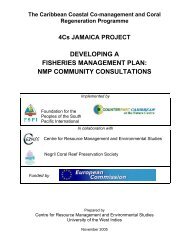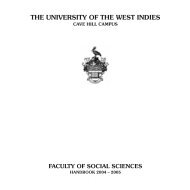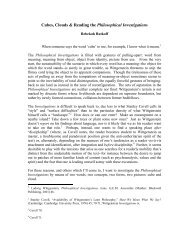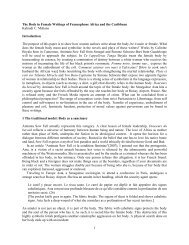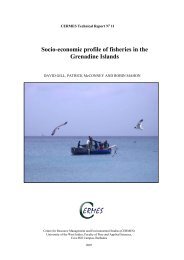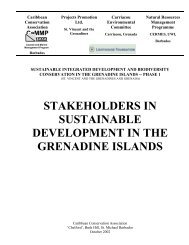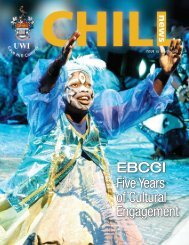THE SUSTAINABLE GRENADINES PROJECT - The University of ...
THE SUSTAINABLE GRENADINES PROJECT - The University of ...
THE SUSTAINABLE GRENADINES PROJECT - The University of ...
Create successful ePaper yourself
Turn your PDF publications into a flip-book with our unique Google optimized e-Paper software.
Although there was no fisheries management plan at the time that the regulations were established, a plan is implicit in<br />
them. <strong>The</strong>y address the conservation <strong>of</strong> lobsters, turtles, conch, corals, reef fishes and coastal pelagic fishes, all <strong>of</strong> which are<br />
important living resources in the southern Grenadines.<br />
<strong>The</strong>re has not been any thorough evaluation <strong>of</strong> the success <strong>of</strong> these regulations in conserving the resources in question.<br />
Various reports indicate that lobster, conch and reef fishes are over-fished in the waters <strong>of</strong> the Grenadines. It is becoming<br />
more widely accepted that depletion <strong>of</strong> reef herbivores has been a significant contributor to the reduction in abundance <strong>of</strong><br />
living corals by allowing algae to increase in abundance and overgrow them (various papers in Ginsburg 1994). Populations<br />
<strong>of</strong> herbivorous reef fishes have been depleted throughout the Caribbean for decades. It appears, that black sea urchins<br />
replaced their function to some extent. When these died <strong>of</strong>f in the early 1980s, algae were observed to overgrow reefs in<br />
many areas <strong>of</strong> the Caribbean.<br />
It may be the case that widespread depletion <strong>of</strong> herbivorous reef fishes, coupled with the slow and patchy recovery <strong>of</strong> black<br />
sea urchin populations in the Grenadines are primary causes <strong>of</strong> coral reef degradation. If so, coral reef conservation must<br />
include initiatives to rebuild populations <strong>of</strong> herbivorous fishes. Dependence on urchins alone, a single species, may be<br />
unwise, as they tend to be a nuisance to divers and snorkelers and could be eliminated by another epidemic.<br />
Government <strong>of</strong> St. Vincent and the Grenadines. Act No. 26 <strong>of</strong> 1987. St. Vincent and the Grenadines Port Authority<br />
Act.*<br />
An Act to provide for the establishment <strong>of</strong> an Authority to be known as the St. Vincent and the grenadines Port Authority;<br />
to provide a coordinated and efficient system <strong>of</strong> port facilities and services; and for the purpose <strong>of</strong> providing duties and<br />
powers <strong>of</strong> the Authority and for the transfer to, investing in the Authority <strong>of</strong> functions, assets and liabilities <strong>of</strong> the Port and<br />
Marine Department and St. Vincent Port Authority established under the Port Authority Act, 1975 and other matters related<br />
to this.<br />
Government <strong>of</strong> St. Vincent and the Grenadines. Act No. 14 <strong>of</strong> 1991. Environmental Health Services Act.*<br />
An Act to make provision for the conservation and maintenance <strong>of</strong> the environment on the interest <strong>of</strong> health generally and<br />
in particularly in relation to places frequently used by the public.<br />
Government <strong>of</strong> St. Vincent and the Grenadines . Act No. 15 <strong>of</strong> 1991. Litter Act.*<br />
An Act for the regulation and control <strong>of</strong> littering in St. Vincent and the Grenadines. It identifies the <strong>of</strong>fences regarding<br />
penalties such as disposal <strong>of</strong> litter from motor vehicles wilfully breaking bottle or glasses in public places and looks at<br />
administration such as local authority for providing receptacles.<br />
Government <strong>of</strong> St. Vincent and the Grenadines. Act No. 16 <strong>of</strong> 1991. Wildlife Protection Act.*<br />
An Act to provide for the protection <strong>of</strong> wildlife and matters in the country <strong>of</strong> St. Vincent and the Grenadines. <strong>The</strong> first part<br />
looks at wildlife management, protection and control through the establishment <strong>of</strong> a Wildlife Conservation Advisory<br />
Committee, the establishment <strong>of</strong> the reserve, closed seasons and penalties, licences for residents in reserve, special hunting<br />
licences and the importation and exportation <strong>of</strong> wildlife. Part 2 focuses on enforcement, power to search seize and arrest,<br />
punishment while Part 3 provides regulations for the prohibited hunting methods. A list <strong>of</strong> wildlife to be protected (e.g. St.<br />
Vincent Parrot) and details on licences for special hunting and keeping the St. Vincent parrot.<br />
Government <strong>of</strong> St. Vincent and the Grenadines. Act no. 47 <strong>of</strong> 1992. Forest Resource Conservation Act.*<br />
A provision for conservation, management and proper use <strong>of</strong> the forests and watersheds, the declaration <strong>of</strong> forest reserves,<br />
cooperative forests and conservation areas, the prevention and control <strong>of</strong> forest fires.<br />
Government <strong>of</strong> St. Vincent and the Grenadines. Act no. 9 <strong>of</strong> 1997. Marine Parks Act.*<br />
An Act to provide for the establishment <strong>of</strong> Marine Parks and for other related matters.<br />
27




